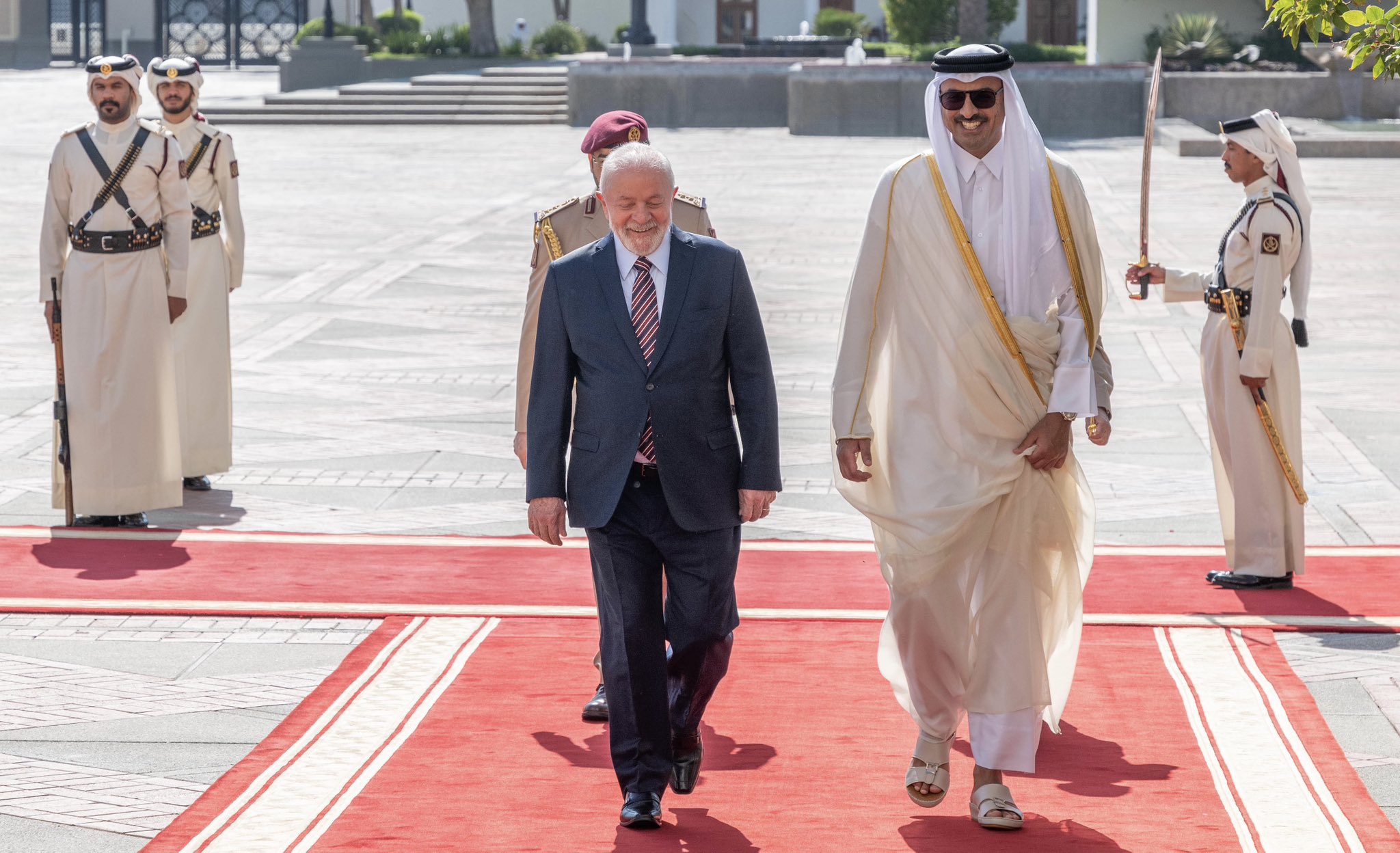Luiz Inácio Lula da Silva, a vocal supporter of the Palestinian cause, called the Israeli aggression on Gaza as a “genocide.”
Qatar’s Amir Sheikh Tamim bin Hamad Al Thani and Brazilian President Luiz Inácio Lula da Silva called for a ceasefire in Gaza on Thursday during official discussions in Doha, the Amiri Diwan said in a statement.
“The two sides stressed the importance of reaching a permanent ceasefire, protecting civilians, delivering humanitarian aid to the people of the Gaza Strip, and finding a solution to the Palestinian cause,” the statement added.
The Brazilian president had landed in Qatar on Wednesday for the official visit, where he was first received by Doha’s Minister of State for Foreign Affairs Mohammed Al Khulaifi, according to the Qatar News Agency (QNA).
In a post on X, Lula said he thanked Sheikh Tamim “for his great effort” in reaching the temporary truce in Gaza and the hostages’ release deal between Israel and Hamas.
Qatari and Egyptian mediation led to a humanitarian pause in Gaza, which initially came into effect on Friday 7:00 AM Gaza local time on November 24 for four days, before it was extended for two additional days on Monday.
The deal was later extended on Thursday almost an hour after the initial truce expired at 7:00 AM Gaza time.
The initial agreement stipulated the release of more than 50 Israeli and foreign captives from Hamas in Gaza in exchange for the release of 150 Palestinian women and children from Israeli prisons.
By Wednesday, the sixth day of the truce, Hamas released 102 captives in Gaza whereas Israel released 210 Palestinian women and children from its prisons, according to a Doha News tally of on the daily announcements of releases by Qatar’s Foreign Ministry.
The truce came on the seventh week of the Israeli genocide in Gaza, which started on October 7.
Israeli occupation forces have killed at least 20,360 Palestinians, including 8,241 children, since the start of the genocide, according to figures by Euro-Med. Over 1.7 million have been displaced.
Lula, a vocal supporter of the Palestinian cause, labeled the Israeli aggression on Gaza as a genocide on October 26.
“It’s not a war, it’s a genocide that has killed almost 2,000 children that have nothing to do with war, they are the victims of this war,” Lula said at the time during a meeting at the Planalto Presidential Palace.
Under his former rule between 2003 and 2010, Lula’s administration had recognised Palestine’s statehood under the 1967 border, a move that angered Israel and its staunchest ally, the United States.
During his visit to Palesitne in 2010, the first Brazilian head of state to do so, Lula said he dreamt of “an independent and free Palestine”.
Brazil has more than 70,000 people of Palestinian origin who make up 14% of Latin America’s population of Palestinians. The large population of those of Palestinian descent is due to the immigration of Arabs to the region in the late 19th century, according to the Institute for Palestine Studies.
The Palestinian immigration to Brazil increased during the Nakba, or “catastrophe,” of 1948 that marked the mass exodus of at least 750,000 Palestinians by Zionist militias to establish Israel.
The Naksa, or “setback,” of 1967, also known as the Six-Day War, forced hundreds of thousands of Palestinians to seek refuge outside of their homeland.
At the time of the Naksa, Israel attacked Egypt, Jordan, Iraq, and Syria. The war ended within six days with Israel’s capture of East Jerusalem, the West Bank and Gaza, in addition to the Syrian Golan Heights and Egypt’s Sinai Peninsula.
The majority of the Latin American region has doubled down on its criticism of Israel since the beginning of the genocide in Gaza.
On November 1, Bolivia officially cut ties with Israel while Chile and Colombia recalled its ambassadors in Tel Aviv. Bolivia had already cut ties with Israel in 2009 under the administration of leftist President Evo Morales, who labeled Israel as a “terrorist state.”
Since the beginning of the war, protests in solidarity with Palestinians in Gaza have also swept through South America, including Brazil, Mexico, Venezuela, Argentina and Chile.







